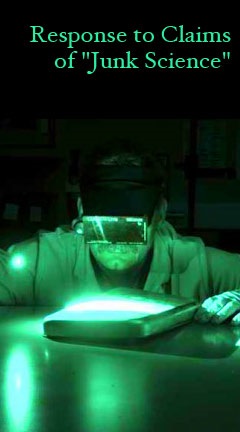Archival Notice
This is an archive page that is no longer being updated. It may contain outdated information and links may no longer function as originally intended.
Home | Glossary | Resources | Help | Course Map
The catchphrase "junk science" has been popularized to describe situations in which the testifying expert, or the expert's testimony and conclusions, is considered or found questionable due to an allegedly poor or insufficient scientific foundation. The testifying expert should be aware that cross-examiners may pursue some of the following lines of questioning in an attempt to challenge a supposedly inadequate, incompetent or unprofessional forensic witness.
Examples:
- Showing that the witness is not very knowledgeable on the subject.
- Exposing a lack of meticulous attention to detail that the expert witness failed to follow in preparation.
- Cross-examining the expert as to lack of activity in the professional field, particularly with regard to current education and training, and lack of appropriate seminar and workshop attendance.
- Avoiding acceptance of the "charlatan" as an expert whenever possible.
- Establishing that the witness has never testified to the same effect previously, which can be damning during cross-examination.
- Establishing that the findings of the testifying witness are not consistent with studies of others, thereby eroding the credibility of the witness.
- Suggesting that the expert's findings often lead to erroneous results, which again jeopardizes the expert's credibility.
- Often an expert will indicate that present methods are positively related to prior methodology. If that linkage and connection can be dispelled, the weight of testimony and credibility of the witness are threatened.
- The witness should be pressed for literature that tends to support the testimony. Absence of such literature bolsters the claim of lack of competence and credibility.
- If tests or examinations conducted by the forensic expert have never been admitted as evidence in a court or other dispute resolution process, this can bring the validity of the extant testimony into question.
- The aggressive cross-examiner will often show that there is no government regulation or statutory support for the expert testimony, or show that the expert testimony is not approved by the scientific community nor by any government-sponsored methodology.
- If the cross-examining attorney can establish that the scientific, technical or professional community does not rely on the same tests, procedures or techniques followed by the expert, the expert witness's testimony is seriously eroded.
Additional Online Courses
- What Every First Responding Officer Should Know About DNA Evidence
- Collecting DNA Evidence at Property Crime Scenes
- DNA – A Prosecutor’s Practice Notebook
- Crime Scene and DNA Basics
- Laboratory Safety Programs
- DNA Amplification
- Population Genetics and Statistics
- Non-STR DNA Markers: SNPs, Y-STRs, LCN and mtDNA
- Firearms Examiner Training
- Forensic DNA Education for Law Enforcement Decisionmakers
- What Every Investigator and Evidence Technician Should Know About DNA Evidence
- Principles of Forensic DNA for Officers of the Court
- Law 101: Legal Guide for the Forensic Expert
- Laboratory Orientation and Testing of Body Fluids and Tissues
- DNA Extraction and Quantitation
- STR Data Analysis and Interpretation
- Communication Skills, Report Writing, and Courtroom Testimony
- Español for Law Enforcement
- Amplified DNA Product Separation for Forensic Analysts
Additional Online Courses
- What Every First Responding Officer Should Know About DNA Evidence
- Collecting DNA Evidence at Property Crime Scenes
- DNA – A Prosecutor’s Practice Notebook
- Crime Scene and DNA Basics
- Laboratory Safety Programs
- DNA Amplification
- Population Genetics and Statistics
- Non-STR DNA Markers: SNPs, Y-STRs, LCN and mtDNA
- Firearms Examiner Training
- Forensic DNA Education for Law Enforcement Decisionmakers
- What Every Investigator and Evidence Technician Should Know About DNA Evidence
- Principles of Forensic DNA for Officers of the Court
- Law 101: Legal Guide for the Forensic Expert
- Laboratory Orientation and Testing of Body Fluids and Tissues
- DNA Extraction and Quantitation
- STR Data Analysis and Interpretation
- Communication Skills, Report Writing, and Courtroom Testimony
- Español for Law Enforcement
- Amplified DNA Product Separation for Forensic Analysts


